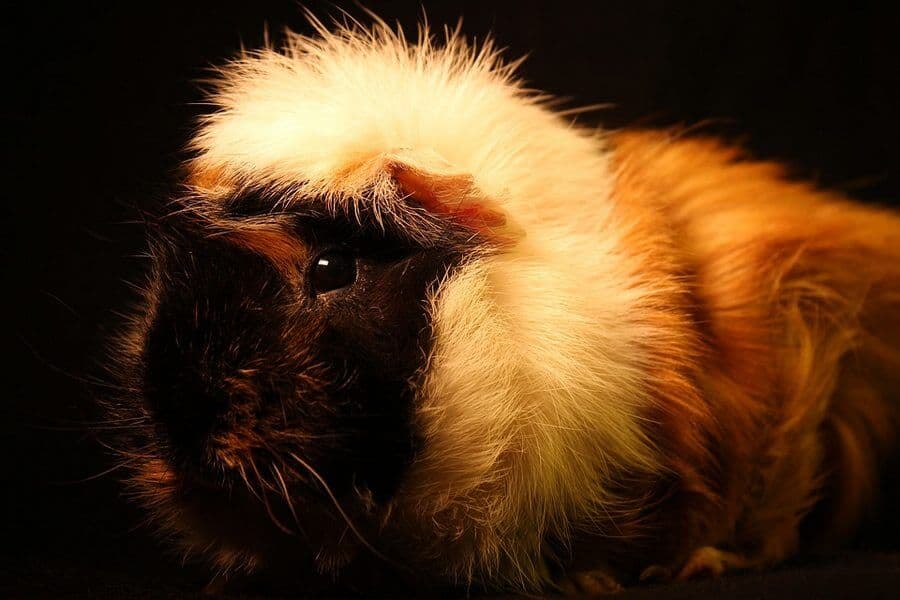Guinea pigs are remarkable rodents that are often kept as pets. While they are misunderstood by some as being boring pets, they are in fact sweet, lovable creatures. They are generally quiet rodents who enjoy chewing on paper, wood, and hay. Moreover, they love various fruits and veggies.
Every guinea pig has its own personality despite its reputation as being boring. Each one is special and enjoys different things. Some guinea pigs enjoy small stuffed dog toys and soft surfaces while others enjoy tunnels, toys, and hideaways.
Because of the uniqueness that they can possess, owners of guinea pigs create a strong bond with these rodents. As with any form of life, guinea pigs do eventually pass away. As they get closer to the end of their time on Earth, there are ways for guinea pig owners to make their final moments just as special as they were in their life.
Guinea pigs are fragile throughout their lives. They have small bones, sensitive skin and fur, and sensitivities to loud noises. Caring for a guinea pig while it is dying has its similarities with how to care for them regularly. Primarily, they should be handled with extreme care. This is particularly true during its time leading up to its death as they become much more fragile.
Any quick movements or rough handling could cause unwarranted pain to a guinea pig. In general, guinea pigs do not display outward signs of pain (except in extreme cases). Because of this, it is critical to handle them very, very carefully to ensure that they aren’t experiencing any more pain than what they might already be having.
The best way to care for a dying guinea pig is not to over-handle them. The only time they should be picked up or moved is if it’s absolutely necessary. When picking them up it’s crucial to do so slowly with two hands. Their feet should always be supported and barely any pressure should be applied.
This ensures their comfort during the need to pick them up. If they need medication, this would be an essential reason to move them or pick them up. Otherwise, for their comfort, they should be allowed to sit where they are comfortable.
Even though they are dying, guinea pigs shouldn’t be sitting in their own feces or urine. Another essential reason to move a dying pig can be to help them get to a drier space in their cage. With careful hands, they can be moved to other parts of their cage.
When a guinea pig is dying they may find it too cumbersome to move around as they normally do. In this instance, it is important to help them feel as normal as possible and carefully move them. Cleaning up under the spot from where they were moved helps keep their cage clean during their time of need as well.
How Do You Make A Dying Guinea Pig Comfortable?
A part of making a dying guinea pig comfortable includes moving them very minimally while ensuring they aren’t sitting around in their urine or feces. However, this isn’t the only way to make a dying piggie comfortable.
Due to their size, a dying guinea pig might be experiencing some pain and may not want to be overly bothered. Making them as comfortable as possible helps them live their last days (or weeks) out as best as possible. Below are some ways to make a dying guinea pig comfortable.
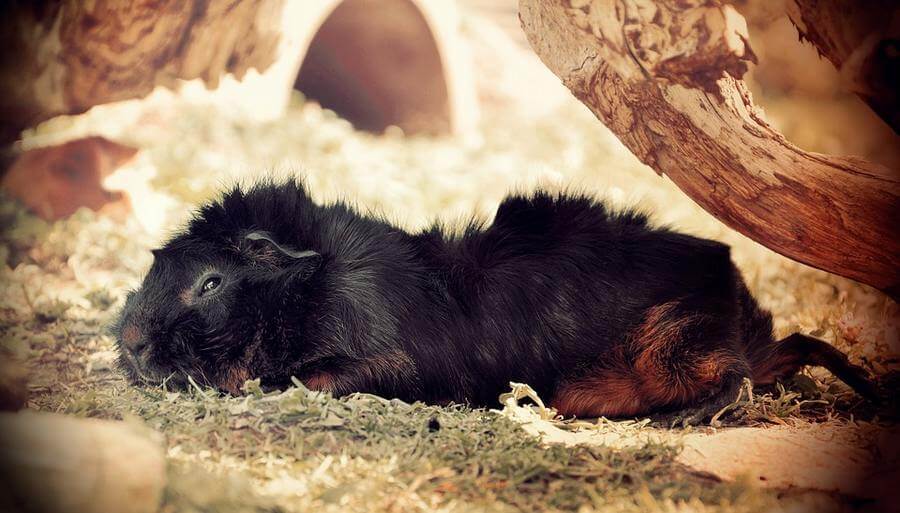
Ways To Help A Dying Guinea Pig Comfortable
1. Give Them Critical Care Feedings
Critical care is a special fortified product that gives sick or dying animals the nutrients they need. It is a well-known product and spans many species. However, the use of critical care is widely known for treating guinea pigs or other rodents and even rabbits.
It is basically a hay powder with added nutrients that are mixed with warm water to create a semi-thick substance that can be fed to a sick or dying animal.
The best way to administer this product to a guinea pig is through a pusher syringe. These are plastic syringes that suck up liquids to be pushed or plunged into an animal’s mouth so that they can get regular feedings.
This is particularly helpful for dying guinea pigs as they might be eating significantly less or not eating at all. The taste is generally liked by most piggies and there usually isn’t an issue getting them to latch onto the syringe for feedings.
However, in the case of really ill piggies, it might be necessary to help them in getting the critical care liquid out of the syringe. This is usually a two-person job that requires someone to carefully hold the piggie while the other one administers the liquid by pushing the syringe in the corner of the mouth to ensure it is going down the throat.
For guinea pigs who are not able to move about that well or are very clearly not interested in being fussed with, providing critical care on a small plate or spoon is helpful. If they are not accepting the critical care in this way, it may be necessary to help them with the syringe anyways, but it is worth trying for the sake of their comfort.
2. Always Keep Your Guinea Pig Cage Clean
A guinea pig’s cage should always be kept clean, regardless of its health. In doing so, it maintains their health as much as possible. When a guinea pig is dying it is even more important to clean its cage, perhaps even more often than usual.
This ensures that the piggie isn’t being subjected to strong smells that might be affecting its respiratory system. Additionally, it helps their feet and fur stay dry.
When they are laying in the same spot for most of the day, they are bound to get wet fur or feet. This is where carefully moving them is important. It allows for the area that was under them to be cleaned up and refreshed with clean paper bedding (or fleece).
Even though they are dying, their mental health and physical health is still very important. In providing a clean cage, these basic needs can be met to keep them comfortable.
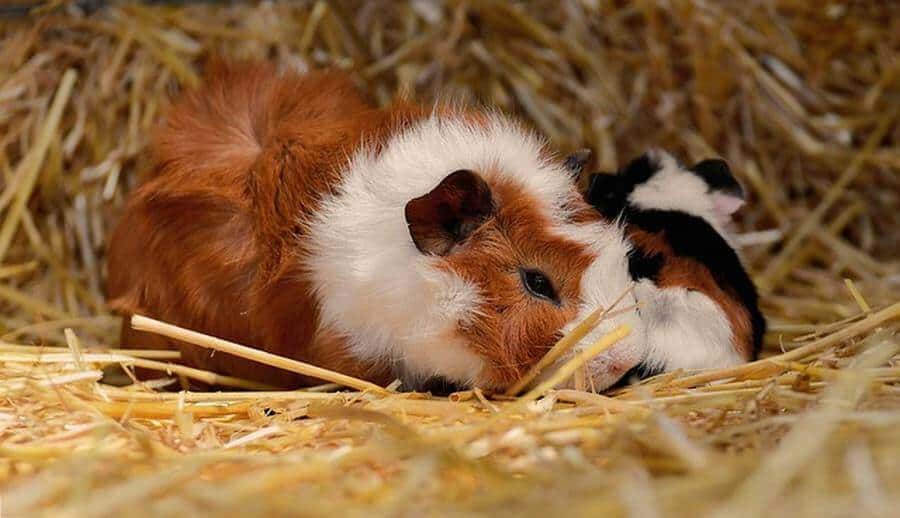
3. Give Them Soft Things To Lay Down On
Whether it’s a stuffed animal, a comfy piece of fleece, or a small blanket, soft things will give the piggie great comfort. This is particularly true for dying piggies that might have lost use of their legs or simply due to their general discomfort.
The paper bedding is soft but providing an additional means of soft material for them to lay down on is very helpful. Considering that they will be laying around more and sleeping more, soft things are an excellent way to help them out.
4. Soften Your Guinea Pigs Favorite Treats
If a guinea pig is having issues eating their favorite treats, softening them up can aid them in eating. The best example of this is their vitamin c tablets that are critical to overall health.
While it might seem fruitless to provide these tablets to a dying guinea pig, it provides comfort by maintaining a part of their routine that they might not be able to regularly follow anymore.
These tablets can be softened up by soaking them under hot water for up to a minute. They should be allowed to completely cool before offering them to the guinea pig. This is a helpful way to bring comfort to a dying guinea pig that might still be able to eat certain foods.
Not all dying guinea pigs stop eating. Some simply have a harder time than they usually do.
In addition to softening up treats, the regular food that they might still be consuming should be cut into smaller pieces. These smaller pieces make it easier for them to chew and swallow. Cucumbers or green peppers can be sliced thin and offered to the piggie.
This is critical in maintaining their comfort. If they are able to still eat, they should.
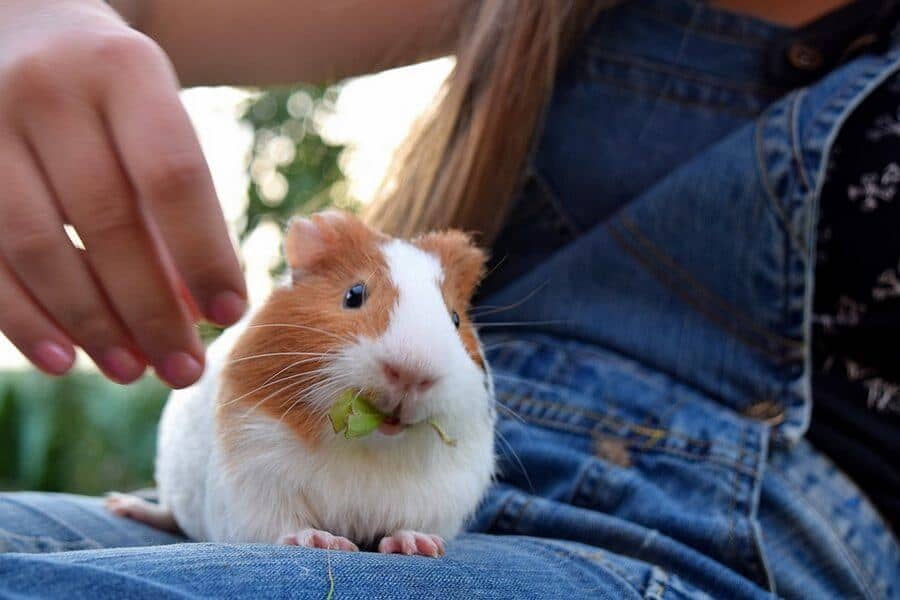
5. Give Them Their Space
While it is certainly important to clean their cage and move them to other spots within the cage, giving a dying guinea pig space is another crucial way to bring them comfort. If they will take their pusher syringe of critical care without assistance, they can be offered the syringe without moving them and allowing them to accept it at their own pace.
Otherwise, the only time they should be bothered is if it’s time to provide a critical care feeding. At all other times, they should be left alone and checked up on periodically throughout the day to make sure they have everything they need.
6. Talk To Your Guinea Pig
Talking to a dying guinea pig can help them feel more comfortable. The sound of their owner’s voice is something that they normally hear and simply talking to them is nice. This isn’t easy for a lot of guinea pig owners because witnessing their guinea pig dying is hard enough.
Talking to their piggies might be difficult but in the end, it makes any final times more meaningful for them and their owners.
7. Make Sure They Are Getting Their Medications
Providing medicine to a dying piggie isn’t as counterproductive as it might seem. A lot of times, a dying guinea pig will be prescribed pain medication from their vet. This aids in keeping them as relaxed as possible during whatever time they may have left on Earth.
Giving them their pain meds and any other medication they might be taking will assist a great deal with their comfort.
This may require handling them as they may not take the pusher syringe of medication. If this is necessary, as advised, they should be handled as carefully as possible. Administering the medicine should be done however is easier for the piggie.
Whether is via the plunger syringe or by spoon or put with veggies they might be able to eat, it is important to use whatever method is easiest.
8. Help Them To Relieve Themselves
Male guinea pigs often have issues with releasing their feces as they get over the age of 4 or 5. This is because they can lose control of the muscles in their rear ends that expel the pellets of poop. When this occurs, the poops can build up and they will need assistance getting them out.
This is not at all pleasant and often smells but it is very necessary. If they aren’t cleaned out it can cause more problems for the piggie on top of their eventual death.
If they are periodically pushed out, there shouldn’t be any issues. Because of their status of nearing death, they are more than likely going to have issues in doing this even more than usual. In order to make them as comfortable as possible, helping them to remove the pellets of poop is necessary.
The best way to do this is by feeling for the hardened ball of feces and helping to guide it out. As expressed, this is not pleasant. It might be too stressful for the piggie to go to the vet during their last moments but an exotic vet can help if a guinea pig owner isn’t comfortable or able to perform this task.
Making a guinea pig comfortable is important during their final time on Earth. It is one last gesture to them that they are cared for.
What Are The Signs Of A Dying Guinea Pig?
Knowing the signs of a dying guinea pig can help a pet owner realize what steps to take next. Whether they may need to get them to an emergency vet or prepare to make them comfortable, knowing the signs is critical. Below are the signs of a dying pig to watch for.
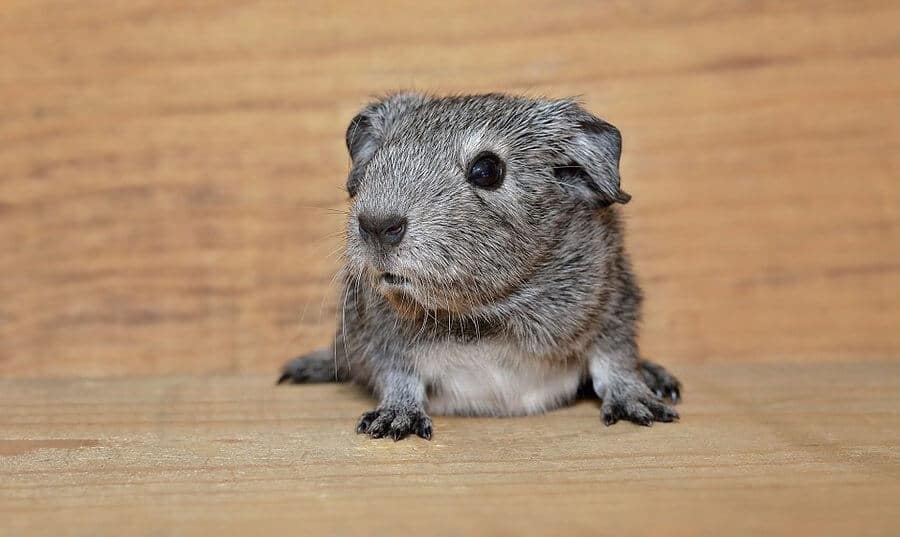
Signs Of A Dying Guinea Pig
- Shallow or labored breathing
- Loss of appetite
- Loss of thirst
- Weight loss
- Crusty eyes
- Respiratory Issues
- Blood in urine or feces
- Fever
- Lethargic movement
- Old age
These are the most common signs of a dying guinea pig. Most of them are readily noticeable while other symptoms aren’t as clear. For example, fever is really only detectable by excessive heat on the guinea pig’s body. If any of these signs are noticed, they should be taken to a vet as soon as possible.
In some cases, there might be a treatment available. However, in other cases, they might not be able to be saved. In this case, it is important to aid guinea pigs in their final moments.
Old age could be a reason behind the other things on this list appearing. As piggie ages, it may show signs of death. A guinea pig’s life expectancy is said to be around 5 to 8 years. As they approach 5 years of age, they may start showing any of the above signs due to their old age.
Their small bodies age much faster than other animals. This is why it is important to track their age as best as possible if no known illness is immediately present.
How Long Does It Take For A Dying Guinea Pig To Die?
Guinea pigs who are exhibiting extreme lack of movement, loss of appetite, and simply aren’t as lively may be close to their deathbed. It is estimated it takes around 1 to 3 days for a dying piggie to pass away if it is near the end of its life.
However, this isn’t necessarily concrete. A dying guinea pig may live longer or less depending on its overall condition. Another factor to consider is how it is being cared for. If critical care is being provided, they may stick around a bit longer.
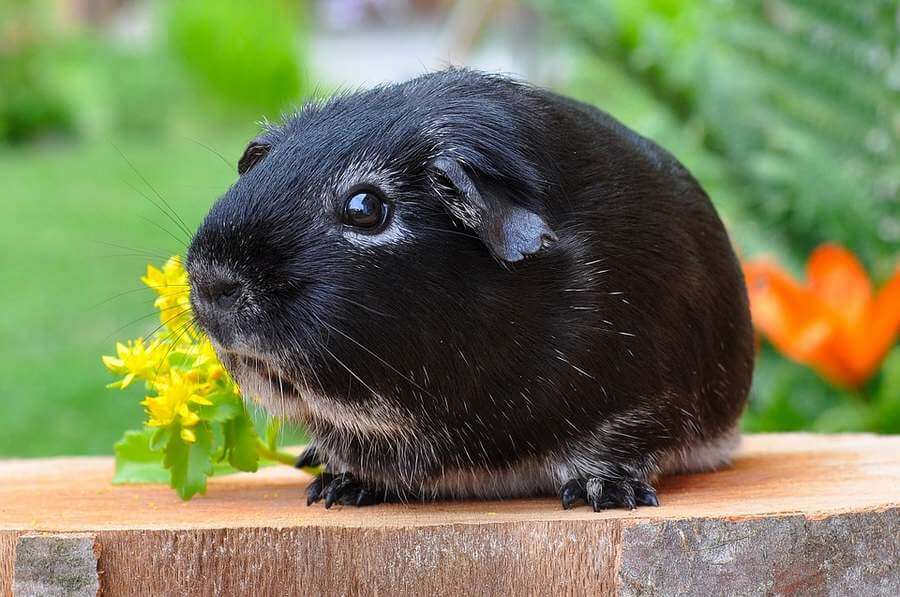
Ultimately, even though a guinea pig might be exhibiting some signs signifying death, they might still survive for a longer period of time than just a few days. This is particularly true for piggies who are still eating on a normal basis but might be showing other signs of death nearing.
As difficult as it can be, it is up to the pet owner to decide if any drastic measures need to be taken.
Ideally, a dying guinea pig will find more comfort in passing away at home surrounded by things it finds familiar. If this is possible and a guinea pig owner can provide as much comfort for its pet as they can, this is a great option.
While any other alternatives might be too difficult to accept, it is up to the guinea pig owner to really gauge the situation and choose what is best for the sake of their animal’s well-being. These little rodents take such a big part of their owner’s heart and at the end of their days, they deserve to be as comfy as they can be.
Most Common Ways For A Guinea Pig To Die
The most common ways for guinea pigs to die are old age and illness. A guinea pig can live anywhere from 7 – 15 years of age, but the average lifespan is around 10 years. The life expectancy of a guinea pig is in part due to genetics and in part due to lifestyle.
For example, some lucky individuals will live longer than their counterparts that do not socialize as much or eat bad food when they’re young.
More Pages On Guinea Pigs
Guinea pigs are one of the world's most unique and adorable rodent pets. These creatures have such large personalities and are often misunderstood. Having a guinea pig as a pet comes with...
Getting a guinea pig for a pet is such an exciting experience! These adorable rodents are quirky pets that are really fun to engage with. Guinea pigs have a reputation of being boring, however, this...


